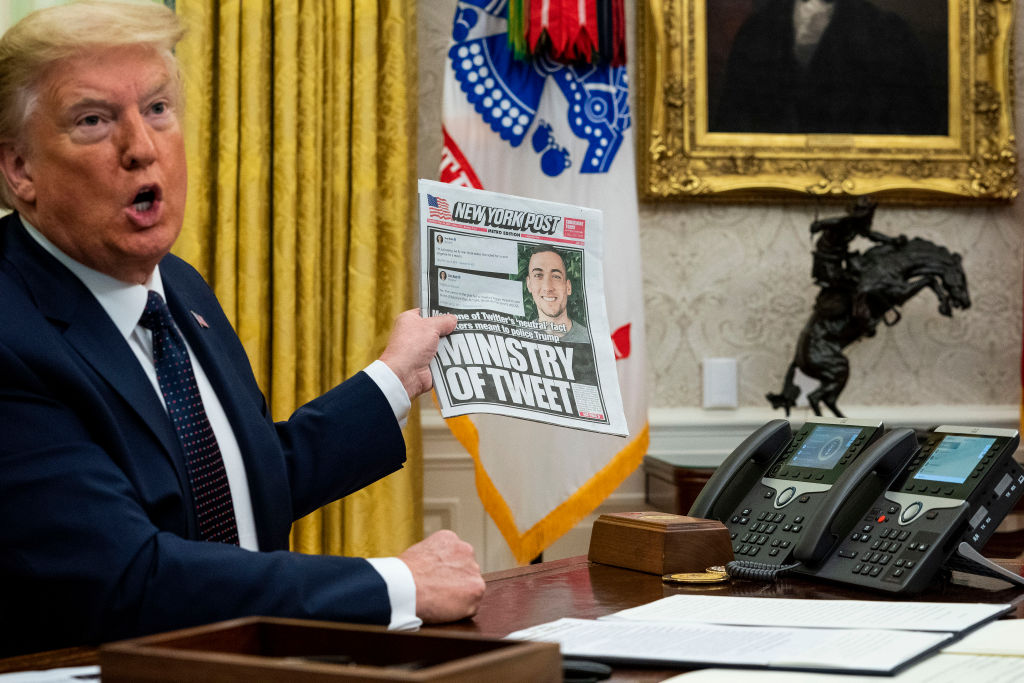Trump's social media executive order could force social media to censor Trump


A free daily email with the biggest news stories of the day – and the best features from TheWeek.com
You are now subscribed
Your newsletter sign-up was successful
There are a lot of legal, ethical, political, and constitutional questions about the executive order President Trump signed Thursday purporting to "defend free speech" by regulating social media companies. But there's also a practical one: Is Trump shooting himself in the foot?
Trump's executive order targets Section 230 of the 1996 Communications Decency Act, a foundational internet law that shields websites like social media companies from liability for most things users post to their sites. If Trump is successful, Twitter, Google, and Facebook "could face legal jeopardy if they allowed false and defamatory posts," Peter Baker and Daisuke Wakabayashi explain at The New York Times. "Without a liability shield, they presumably would have to be more aggressive about policing messages that press the boundaries — like the president's."
"Ironically, Donald Trump is a big beneficiary of Section 230," said Kate Ruane at the American Civil Liberties Union. "If platforms were not immune under the law, then they would not risk the legal liability that could come with hosting Donald Trump's lies, defamation, and threats."
The Week
Escape your echo chamber. Get the facts behind the news, plus analysis from multiple perspectives.

Sign up for The Week's Free Newsletters
From our morning news briefing to a weekly Good News Newsletter, get the best of The Week delivered directly to your inbox.
From our morning news briefing to a weekly Good News Newsletter, get the best of The Week delivered directly to your inbox.
Giving Twitter a legal imperative to, say, remove posts in which Trump falsely accuses a prominent critic of murder isn't Trump's desired outcome, Baker and Wakabayashi note. "What he wants is the freedom to post anything he likes without the companies applying any judgment to his messages, as Twitter did this week when it began appending 'get the facts' warnings to some of his false posts on voter fraud." But as with the Communications Decency Act, Trump can't unilaterally nullify the law of unintended consequences.
Perhaps luckily for Trump, his executive order probably has no legal teeth and, if challenged in court, will almost certainly be struck down. "Donald Trump's order is plainly illegal," said Sen. Ron Wyden (D-Ore.), one of the 1996 law's authors. You can learn more about Section 230, including why it has critics on the left and right — for different reasons — in this Washington Post explainer.

Trump's effort to quashing Section 230 by executive fiat immediately "touched off widespread opposition, uniting Democratic lawmakers, digital experts, longtime conservative-leaning advocacy groups, and a bevy of free speech activists," the Post reports.
"Social media can be frustrating," said Jessica Rosenworcel, a Democratic member of the Federal Communications Commission, one of the independent agencies Trump directed to act. "But an executive order that would turn the Federal Communications Commission into the president's speech police is not the answer."
A free daily email with the biggest news stories of the day – and the best features from TheWeek.com
Peter has worked as a news and culture writer and editor at The Week since the site's launch in 2008. He covers politics, world affairs, religion and cultural currents. His journalism career began as a copy editor at a financial newswire and has included editorial positions at The New York Times Magazine, Facts on File, and Oregon State University.
-
 The Week Unwrapped: Do the Freemasons have too much sway in the police force?
The Week Unwrapped: Do the Freemasons have too much sway in the police force?Podcast Plus, what does the growing popularity of prediction markets mean for the future? And why are UK film and TV workers struggling?
-
 Properties of the week: pretty thatched cottages
Properties of the week: pretty thatched cottagesThe Week Recommends Featuring homes in West Sussex, Dorset and Suffolk
-
 The week’s best photos
The week’s best photosIn Pictures An explosive meal, a carnival of joy, and more
-
 TikTok secures deal to remain in US
TikTok secures deal to remain in USSpeed Read ByteDance will form a US version of the popular video-sharing platform
-
 Unemployment rate ticks up amid fall job losses
Unemployment rate ticks up amid fall job lossesSpeed Read Data released by the Commerce Department indicates ‘one of the weakest American labor markets in years’
-
 US mints final penny after 232-year run
US mints final penny after 232-year runSpeed Read Production of the one-cent coin has ended
-
 Warner Bros. explores sale amid Paramount bids
Warner Bros. explores sale amid Paramount bidsSpeed Read The media giant, home to HBO and DC Studios, has received interest from multiple buying parties
-
 Gold tops $4K per ounce, signaling financial unease
Gold tops $4K per ounce, signaling financial uneaseSpeed Read Investors are worried about President Donald Trump’s trade war
-
 Electronic Arts to go private in record $55B deal
Electronic Arts to go private in record $55B dealspeed read The video game giant is behind ‘The Sims’ and ‘Madden NFL’
-
 New York court tosses Trump's $500M fraud fine
New York court tosses Trump's $500M fraud fineSpeed Read A divided appeals court threw out a hefty penalty against President Trump for fraudulently inflating his wealth
-
 Trump said to seek government stake in Intel
Trump said to seek government stake in IntelSpeed Read The president and Intel CEO Lip-Bu Tan reportedly discussed the proposal at a recent meeting
